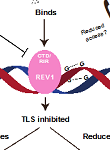|
|
|
Translesion Synthesis: An emerging new target during chemotherapy
|
|
|
|
|
|
|
|
|
|

|
|
|
|
Cynthia A. Harris and Nimrat Chatterjee, PhD
|
|
|
|
Massachusetts Institute of Technology
|
|
Department of Biology, MIT, Cambridge 02139, USA
|
|
nimratc@mit.edu
|
|
|
|
|
|
|
|
|
|

|
|
Translesion synthesis (TLS) is an important mechanism where a group of polymerases come together to orchestrate the bypass of aberrant DNA lesions. This process enables survival of those cells, which would have otherwise been committed to die because of these difficult to repair DNA lesions. Interestingly, siRNA knockdown of TLS polymerases in cancer cells was shown to sensitize cells to increased killing and reduced mutagenesis following treatment with chemotherapeutic drugs, which suggests an important role of TLS polymerases in chemoresistance and cancer relapse. Recent investigations showed that small molecule inhibitors (SMi) that specifically bind REV1 TLS polymerases and suppressed its protein-protein interactions with other TLS polymerases, also successfully sensitized cancer cells to enhanced killing and reduced mutagenesis. As such, the possibility of a SMi that specifically binds REV1 and inhibits TLS, will serve as a chemotherapy adjuvant and prevent chemoresistance and cancer relapse is now a promising possibility. In this mini-review, we will provide a brief discourse of the overarching importance of TLS polymerases in normal and cancer cells and describe characteristics of current and future TLS inhibitors that will potentially serve as clinical chemotherapeutic adjuvants.
|
|
|
|
|
|
|
|

|
|